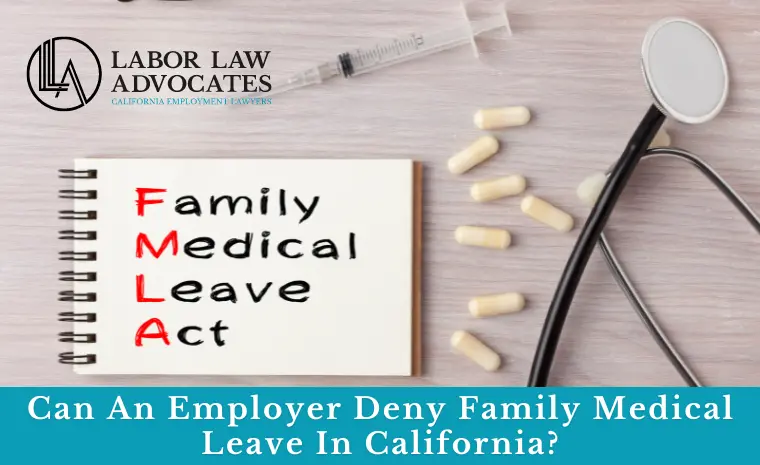Can An Employer Deny Family Medical Leave In California?
One of the biggest concerns employees have when they need time off due to personal or family medical reasons is whether or not their employer can deny them the leave.
Family Medical Leave (FML) is primarily for employees to seek time off work to take care of themselves or their loved ones without the risk of losing their jobs. However, most employees are not aware of the processes involving the FMLA and wonder if their employer can deny them medical leave.
In this blog, we will discuss the laws surrounding family medical leave and whether or not an employer can decline an employee’s request.
Unsure on how to proceed after your family medical leave is denied?
Understanding Family Medical Leave
Family Medical Leave Act, often referred to as FMLA, is a federal law in the United States that grants eligible employees the right to take unpaid, job-protected leave for certain family or medical reasons. The FMLA applies to employers with 50 or more employees and ensures that eligible employees can take up to 12 weeks of unpaid leave within a previous 12-month period for:
- The birth, adoption, or fostering of a child
- Caring for a spouse, child, or parent with serious health issues
- The employee’s own serious health condition
Am I Eligible to Apply for a FML?
To be eligible for family medical leave, individuals must fulfill specific conditions. Those who meet the eligibility criteria should adhere to the following prerequisites:
- Submission of leave requests based on reasons such as pregnancy, adoption, foster child care bonding, personal or family illness, or military deployment.
- Completion of a minimum of 12 months of service with the same employer.
- Accumulation of 1,250 work hours within the preceding 12 months of employment.
- Employment by an organization employing 50 or more individuals within a 75-mile radius.

Can an Employer Deny Family Medical Leave?
The short answer is no. A covered employer cannot outright deny you the family medical leave rights if you meet the eligibility criteria. However, besides the eligibility of the employee, there are certain conditions and limitations to be aware of:
- Notification: While you have the right to take family medical leave, you need to provide your employer with sufficient notice. It’s advisable to notify your employer as soon as you’re aware of the need for leave, although medical emergencies may be an exception.
- Medical Certification: Your employer has the right to request certification for your or your family member’s medical condition. Failing to provide proper certification for their health care provider could impact your entitlement to FMLA.
- Company Policies: Employers may have specific policies that govern FMLA leave. It’s essential to familiarize yourself with these policies and follow the established procedures.
- Fraudulent Claims: If your employer suspects fraudulent use of FMLA leave, they may investigate the matter. Providing false information to take advantage of leave can have serious consequences.
Family Medical Leave Laws in California
California, known for its progressive stance on workplace rights, offers additional protections for workers and their employment. The California laws that support the FMLA are:
California Family Rights Act
Within the framework of the California Family Rights Act (CFRA), employees are granted the opportunity to embrace a meaningful 12-week leave window. This span serves to facilitate bonding with a new child, including adoption scenarios.
For eligibility under the CFRA, an employee needs to have maintained employment with their current employer for a minimum of one year or clocked in 1,250 work hours.
California Paid Family Leave
The California Paid Family Leave (PFL) initiative extends its hand to furnish paid family leave for an eight-week period post-birth. Qualifying employees under the PFL umbrella stand to receive a range of 60-70% of their regular wages. Eligibility for PFL entails fulfilling the following requisites:
- Engaging in CFRA leave to provide care for a seriously ill spouse, domestic partner, parent, parent-in-law, grandparent, grandchild, or sibling, or to foster care with a newborn child during the first year post-birth or adoption.
- Demonstrating that taking time off work would equate to wage loss.
- Accruing at least $300 during any calendar quarter, from which deductions were made for California State Disability Insurance (SDI).
- Ensuring the submission of Paid Family Leave Forms to the Employment Development Department (EDD) within 41 days of initiating the family leave period.
Maternity Leave Benefits
Amidst this backdrop, mothers are also bestowed with maternity leave benefits courtesy of the CFRA. Furthermore, mothers are entitled to additional pregnancy disability leave to address both the physical and psychological aftermath of childbirth.
A notable feature is that parents are not mandated to divide CFRA leave. To elucidate, even fathers are entitled to a CFRA leave of full 12-week span (alongside any supplementary pregnancy disability leave allocated to the mother) subsequent to childbirth.
In accordance with the Family and Medical Leave Act (FMLA) and CFRA, employers are obligated to reinstate employees to their former role or a role of similar nature upon their return from leave. The failure to uphold this reinstatement obligation could potentially culminate in a violation of labor laws.
Was your paid family leave denied?
FAQs about Family Medical Leave in California
Is paid leave available?
FMLA itself is unpaid leave, but in California, you might be eligible for paid leave through the state’s Disability Insurance (DI) or Paid Family Leave (PFL) programs.
Can I take intermittent leave?
Yes, both FMLA and CFRA allow for intermittent leave, meaning you can take leave in blocks of time, whether it’s a few hours a day or specific days within a week.
What happens to my health insurance during leave?
Your employer must maintain your health benefits under your insurance during your FMLA/CFRA leave just as if you were working.
Can I extend my leave beyond 12 weeks?
In certain situations, such as a serious health condition, you may be entitled to an extension of leave under disability laws or reasonable accommodation laws.
What If paid family leave is denied even if I am eligible?
If your employer denies your rightful family medical leave or retaliates against you for taking leave, you can file a complaint with the U.S. Department of Labor or the California Labor Commissioner’s Office with the assistance of an employment lawyer.
Consult with a California Employment Lawyer
Family medical leave is a legal right granted to employees to seek time off work to take care of themselves or their loved ones. If you meet the requirements for the FMLA act, your employer is not allowed to deny your request for medical leave.
However, there are certain circumstances where an employer has the right to decline your request. You must be aware of the restrictions, especially if you do not qualify for FMLA benefits. Therefore, it is essential to know your company’s policies regarding medical leave and plan accordingly.
If you still need to know if your employer can deny your request for medical leave beyond your FMLA benefits eligibility, you should seek the advice of benefits and leave lawyer.
Labor Law Advocates has experienced employment law attorneys who have the expertise to guide you through the appeals process and advocate on your behalf for an improved result.
Speak with one of the experts at Labor Law Advocates for a free consultation. We are available 24/7. Call us anytime at (424)-688-3632.




